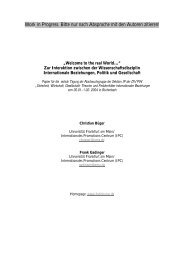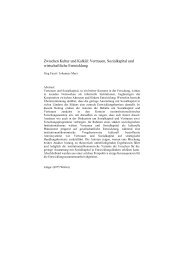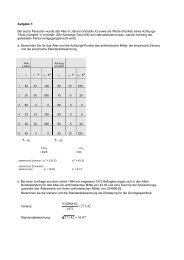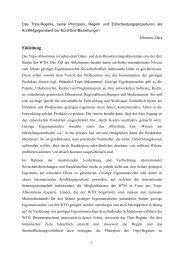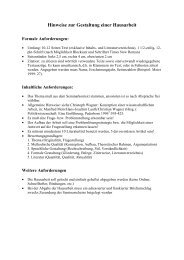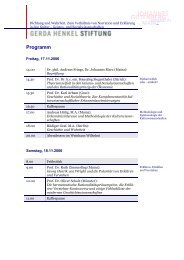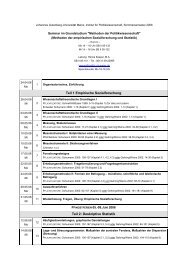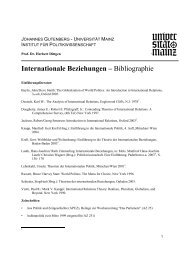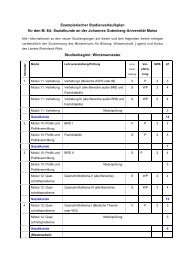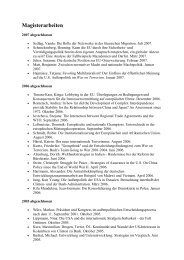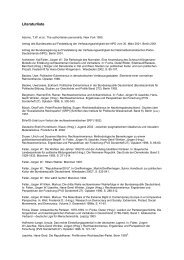Feedback Effects in Foreign Policy: A Framework for Analysis
Feedback Effects in Foreign Policy: A Framework for Analysis
Feedback Effects in Foreign Policy: A Framework for Analysis
You also want an ePaper? Increase the reach of your titles
YUMPU automatically turns print PDFs into web optimized ePapers that Google loves.
28<br />
argumentative negotiations. Only few studies <strong>in</strong> FPA have hitherto discovered the<br />
<strong>in</strong>teractive dimension of human agents from a constructivist po<strong>in</strong>t of view. In the traditional<br />
l<strong>in</strong>e of Janis’s work, <strong>for</strong> <strong>in</strong>stance, there are a few authors who attempt to th<strong>in</strong>k Beyond<br />
Groupth<strong>in</strong>k (‘t Hart/Stern/Sundelius 1997) and develop the classic account of Janis <strong>in</strong> new<br />
methodological directions. A recent edited volume of Donald Sylvan and James Voss (1998)<br />
bundles the current FPA literature on cognitive fram<strong>in</strong>g and problem representation. These<br />
authors deal <strong>in</strong> different k<strong>in</strong>d of methods with the relationship how group environments<br />
affect <strong>in</strong>dividual cognition. Although Houghton (2007) recently suggested that there is no<br />
h<strong>in</strong>drance to comb<strong>in</strong>e cognitive psychological approaches of FPA <strong>in</strong> the tradition of<br />
Snyder/Bruck/Sap<strong>in</strong> (1962) and de Rivera (1968) with contemporary constructivist<br />
theoriz<strong>in</strong>g <strong>in</strong> IR, it has to be remarked that such a theoretical open<strong>in</strong>g is still <strong>in</strong> its <strong>in</strong>fancy.<br />
Interpretive policy analysis seems to have proceeded already one step further down<br />
this road. This strand of policy research (Hajer/Wagenaar 2003 <strong>for</strong> an overview) suggests<br />
that governmental politics should be understood <strong>in</strong> a less state-centered fashion and rather<br />
as a complex relationship between state and society. Such approaches could be a theoretical<br />
start<strong>in</strong>g po<strong>in</strong>t <strong>for</strong> a sociologically <strong>in</strong><strong>for</strong>med <strong>for</strong>eign policy analysis as well. Pioneers <strong>in</strong><br />
deliberative policy analysis as Deborah Stone (1988), Mart<strong>in</strong> Re<strong>in</strong> and Donald Schön (1994)<br />
illum<strong>in</strong>ated <strong>in</strong> their analyses why many policy controversies have often an <strong>in</strong>tractable and<br />
stubborn character. Problem solv<strong>in</strong>g <strong>in</strong> such controversies requires a much better<br />
understand<strong>in</strong>g of how various parties framed the situation. They demonstrate that policy<br />
stalemates can be solved when “refram<strong>in</strong>g” of the highly charged issues succeeded. This<br />
underl<strong>in</strong>es the possibilities of collective learn<strong>in</strong>g and conflict resolution. Other authors such<br />
as Dvora Yanow (1996) and Maarten Hajer (1995) more directly follow the proposed<br />
“argumentative turn” (Fischer/Forrester 1993) and elaborate the importance of attend<strong>in</strong>g to<br />
the discursive dimension of public policy and politics. Hence, analyz<strong>in</strong>g discourse politics is<br />
understood <strong>in</strong> terms of struggles over the <strong>in</strong>terpretation of issues rather than over<br />
substantive questions. The crucial question then is whose <strong>in</strong>terpretation becomes<br />
authoritative and why this is so (Fischer 2003: 80). For <strong>in</strong>stance, Hajer (1995) has analyzed the<br />
politics of the acid ra<strong>in</strong> controversy to show how different applications and understand<strong>in</strong>gs<br />
of acid ra<strong>in</strong> have generated very different types of politics <strong>in</strong> two countries. Such a social<strong>in</strong>teractive<br />
approach is thus conceptualized as an exchange of arguments, of compet<strong>in</strong>g,<br />
sometimes contradictory, suggestions of how one is to make sense of reality. For researchers<br />
this means explor<strong>in</strong>g discourse practices through which social actors seek to persuade others<br />
to see a particular situation, event or problem. In contrast to rationalist models such as the<br />
advocacy-coalition approach (Sabatier/Jenk<strong>in</strong>s-Smith 1991) <strong>in</strong> which social actors have fixed



